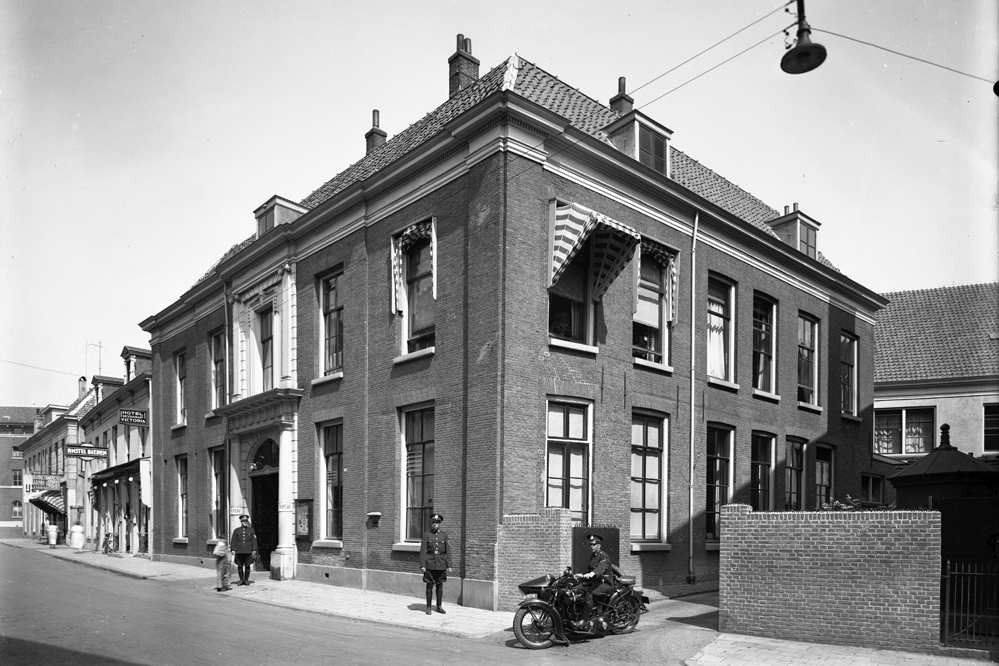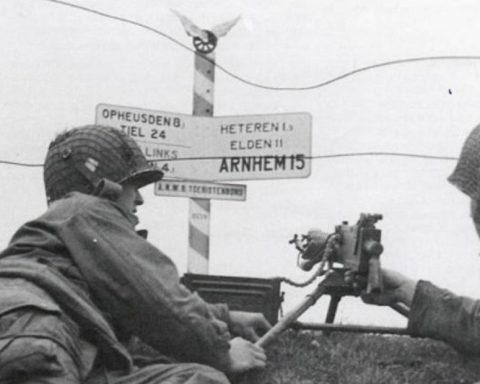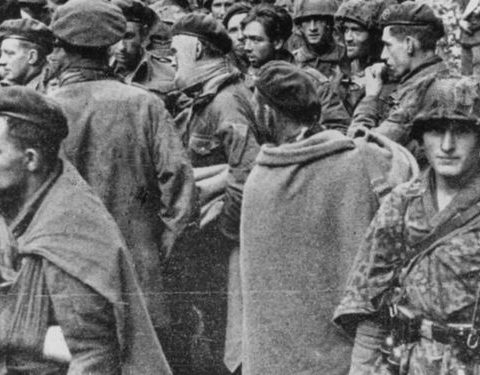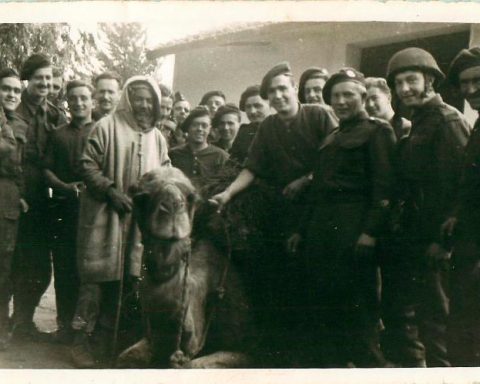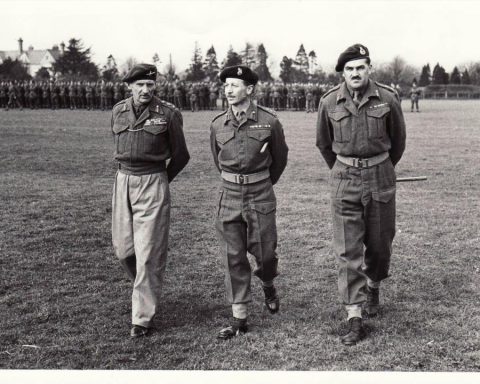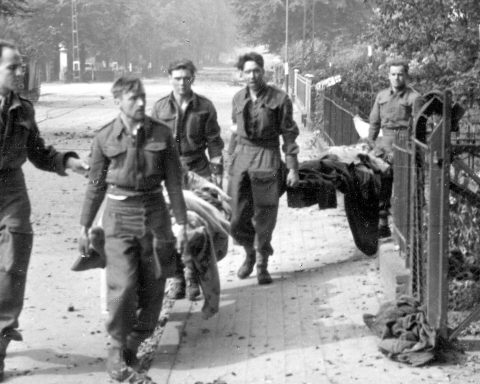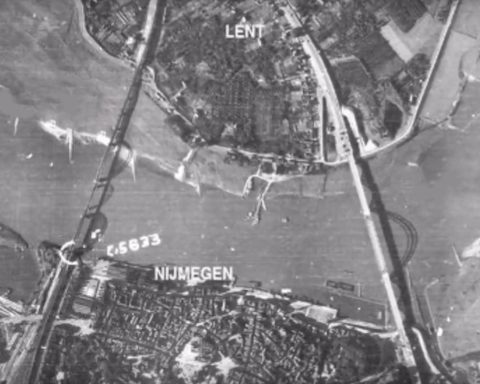While the British airborne division had long since been defeated and Arnhem had been evacuated by order of the Germans, there was still one British soldier in the city center of Arnhem. He managed to stay out of the hands of the Germans until the liberation in April 1945.
This is the remarkable story of British soldier Robert Peatling.
Robert Peatling was part of the 1st Divisional Provost Company. This was the military police of the British airborne troops. Together with nine other soldiers from his company, Pealing had been ordered after the airborne landings on Sunday afternoon, September 17, 1944, to capture the police headquarters in Bovenbeekstraat, in the middle of Arnhem’s city center.
Immediately after the airborne landings, the Germans had already established a defensive line on the west side of Arnhem, but many British managed to reach the city center that day via the Onderlangs along the Rhine without any problems.
The largest unit that entered Arnhem via the Onderlangs was John Frost’s battalion. But Robert Peatling’s unit also entered the city via this route.
Wehrmachtsheim
The police station in Bovenbeekstraat was very busy at that time. Many officers came by with news about the British advance from the direction of Oosterbeek. That evening, police officer Hans van Maris heard from a colleague that he had been stopped on Velperplein by British soldiers who asked him for directions to the Rhine Bridge.
Van Maris: “That wasn’t that difficult: straight ahead, 800 meters further.”
The police officer warned about the Germans who used Musis Sacrum as a Wehrmachtsheim. “The paratrooper was not surprised and said to my colleague: “I know that. We went there to have a look.””
Around half past ten in the evening the police station was taken over by Robert Peatling’s unit.
Van Maris: “One of the inspectors came in with ten members of the British military police and fifteen German prisoners of war.”
After a small party with English cigarettes and chocolate, the paratroopers went to sleep peacefully, to the surprise of the officers.
The next morning, the officers concluded that it might not be wise to remain in the police station. The Germans were present in large numbers everywhere in the city, but British soldiers were not to be seen. There was gunfire from the direction of the Rhine bridge.
SS soldiers
Most of the officers cleared the police station. Police officer Hans van Maris, however, remained at his post. The ten British soldiers still expected the rest of the division to enter Arnhem after dealing with the German resistance.
After this did not happen on Monday, September 18, the British became somewhat concerned. The situation became critical. Their radio didn’t work and they ran out of food. The German prisoners of war also became restless.
One of the prisoners had broken a window and every time someone passed by he shouted: “English. Help!”
Van Maris: “That was without result, but it did get on the nerves of the paratroopers. Some already suggested shooting the prisoners, but the majority was against.”
The next day the British decided to try to reach the Rhine Bridge. To get an idea of the situation, they climbed onto the roof of the police station. From the roof they saw a few Germans standing there. One of the British could not restrain himself and fired his sten gun at the Germans.
However, in doing so they had given away their position. A little later a truck full of SS soldiers stopped in front of the police station. The Germans fired a hail of bullets at the police station and threw hand grenades inside.
From Maris: “A British sergeant was killed and the other paratroopers surrendered.”
At least, that’s what it seemed like. But while his comrades in arms had surrendered to the Germans, Robert Peatling had run into the attic of the police station. That’s where he hid.
Hiding in a ghost town
Peatling concluded that he had the best chance of avoiding the Germans if he stayed where he was. And so Pealing remained in hiding in the attic of the police station for weeks, without anyone noticing.
Pealing initially found food in the police station. He later broke into houses in the area at night.
Arnhem was evacuated by order of the Germans on Monday, September 25, 1944. And on Tuesday, September 26, the last British resistance at Oosterbeek also came to an end. Arnhem was a ghost town with only a few inhabitants. And one of those residents was Peatling.
However, Arnhem was not completely empty. A number of police officers also remained in the city. Three officers unsuspectingly walked into the police station on October 3. They were confronted by Peatling running towards them with his pistol in his hand and announcing that he was an English soldier.
The officers were completely overwhelmed and fled the police station. Peatling then expected that the officers would return together with German soldiers to capture him, but that did not happen.
On Tuesday, October 31, Robert Peatling was discovered again by officers walking into the police station. Peatling, again with his gun in his hand, asked the officers if they could help him. One officer was Hans van Hove, an NSB member. The other agent was Hans van Maris.
Van Maris: “Ten Hove was right on top of it and I was actually more or less forced to refuse help. “You can do whatever you want with him, I don’t interfere and I don’t know anything,” Ten Hove said to me.”
But after Van Maris told Robert Peatling that he thought it was too risky, the NSB agent flew into a rage. Ten Hove threw a few boxes on the ground and angrily walked out of the police station.
“Afterwards, he never betrayed me, and that saved him a considerable punishment after the war,” says Van Maris.
Van Maris promised the British soldier that he would return and left the police station. A while later he returned to tell the hiding Briton that he would be picked up by someone who could offer him shelter.
About an hour later, Van Maris returned accompanied by a Dutchman with a pile of civilian clothes. This man was Johan Penseel; the leader of the largest resistance movement in Arnhem.
Penseel had an electronics store on Velperplein. He had managed to arrange with the municipality that he could stay in Arnhem after the evacuation to provide manual services as an electrician.
Johan Penseel took the British soldier to his own house, where he had set up a hiding place between two rooms that could be reached through a secret door.
Peatling stayed there for two months, until the end of December 1944. But on December 31, 1944, the British soldier was smuggled out of the city by two resistance fighters to another hiding place on the Veluwe.
Deaf-mute electrician
Peatling: “At ten o’clock on an ice-cold New Year’s night I said goodbye to the Penseel family and seated on the luggage carrier of a bicycle with another resistance fighter next to us we went to the checkpoint on the Apeldoornseweg. According to my Ausweis I was a deaf and dumb electrician.”
Peatling managed to get out of the city without any problems and reached his new hiding place near Barneveld. He stayed there until mid-April 1945, when he walked towards the Allied armies that had just liberated Arnhem. Seven months after his landing at Wolfheze, Operation Market Garden was also over for Robert Peatling.
Peatling wrote the book ‘No Surrender at Arnhem’ about his experiences during the Battle of Arnhem, which was published in 2004. Peatling died on February 3, 2007 in his home town of Wimborne Minster.

